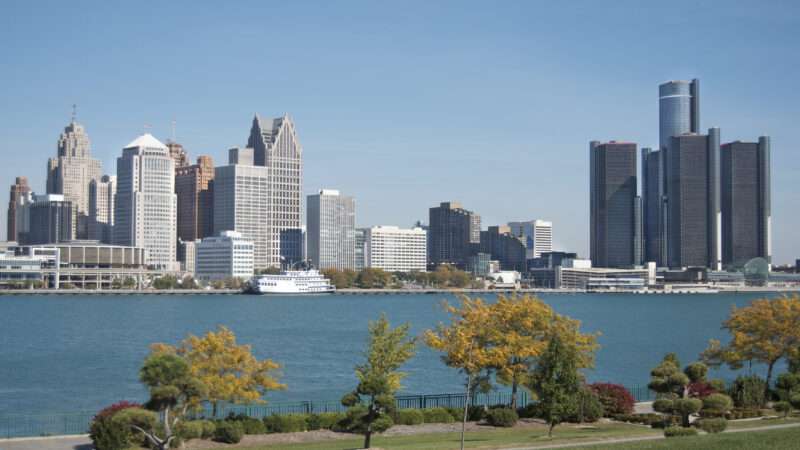
The clock is ticking on Detroit's efforts to adopt a land value tax.
With just a couple weeks left to go in the Michigan Legislature's session, a must-pass package of bills enabling Detroit to tax land values has stalled thanks to the opposition of some Democratic lawmakers.
That spells trouble for Detroit Mayor Mike Duggan, also a Democrat, who has made the adoption of a land value tax his pet issue. He's pitched it as a way to fix the worst elements of Detroit's existing, highest-in-the-nation property taxes.
"We're going to double the taxes on the land, which means you as a homeowner pay less and the people who own abandoned buildings pay more, people who have surface parking lots pay more, and people who have scrap yards, pay more," said Duggan at a community meeting late last month, reports the Detroit News.
The idea that Detroit's property tax system is in need of serious reform is not a controversial opinion.
While much of the rest of the country has too little housing, Motor City arguably has too much. Years of declining population and minimal economic growth have left 18 percent of Detroit's homes vacant. Many of those have fallen into a state of disrepair. The taxable value of Detroit's residential properties has halved in the last decade.
This sad state of affairs has only been made worse by the city's decision to continually increase its property taxes to make up for declining taxable property values.
Instead of netting the city more revenue, continual tax hikes have mostly produced a doom loop of tax foreclosures and property abandonment, which then lowers property values even more, prompting the city to raise rates.
The end result is persistent blight and the suppression of needed development.
Any "new investment boosts the property value which then gets taxed at the high rate. It's extremely high effective tax rates," says Andrew Justus, a housing policy scholar at the Niskanen Center and a former employee at the Detroit Land Bank Authority.
Enter the idea for a land value tax. The idea is that shifting the tax burden from existing homes to the value of the land they sit on will stabilize tax revenue, remove a disincentive for homeowners to improve their properties, and encourage speculating land owners to develop or sell their vacant parcels.
The Lincoln Institute of Land Policy has produced a series of white papers arguing for Detroit to adopt just such a policy. The idea has won a convert in Duggan, who first pitched the idea of a land value tax earlier this summer. In September, he unveiled a more detailed proposal for cutting the city's levy on actual structures while raising its tax on underlying land value.
The mayor argues his plan will give the average homeowner a 17 percent property tax cut while penalizing land owners holding vacant land as a speculative bet. Duggan says the shift to a land value tax will be revenue neutral.
Standing in the way of Duggan's land value tax is a lot of process, politics, and a general distrust of bright ideas from city hall.
In order to implement a land value tax, Detroit voters need to pass a referendum approving the levy. Before that happens, the Michigan Legislature also needs to sign off on the idea.
Getting lawmakers' approval has proven unexpectedly difficult.
In October, Democratic defections and abstentions stalled a package of bills giving Detroit the power to adopt a land value tax. In interviews with Bridge Detroit, legislative opponents said they needed more time to consider the complex proposal and complained that the land value tax issue was taking time away from other issues of statewide concern.
Local property tax activists have also come out strongly against Duggan's land value tax as well. For years, these activists have been fighting the city over-inflated property assessments that have overtaxed Detroit residents by some $600 million and forced many homeowners into tax foreclosure. A land value tax will do nothing to fix the continued overappraisal of property taxes, they argue.
"Mayor Duggan must prioritize stopping the illegally inflated property taxes that still affect the city's lowest valued homes," Bernadette Atuahene, a property law scholar and member of the Coalition for Property Tax Justice told Detroit News.
"A lot of people have expressed skepticism that the mayor's behind this, you can't trust the mayor, so, therefore, this must be a bad proposal regardless of what it does," says James Hohman, the director of fiscal policy at the free market Mackinac Center for Public Policy.
A land value tax wouldn't fix Detroit's lingering problems with tax assessments, says Hohman. But he also doesn't think it would make them any worse. In general, he argues a land value tax would shift the city toward a fairer, less economically damaging system of taxation.
"Better taxes are taxes that influence behavior less. There's not much that any individual landowner can do to affect their land value taxes or avoid their land value taxes. It will encourage some development," says Hohman. "Detroit has a lot of problems and this fixes one of them."
The post Is a Land Value Tax the Solution to Detroit's Messed Up Property Tax System? appeared first on Reason.com.







